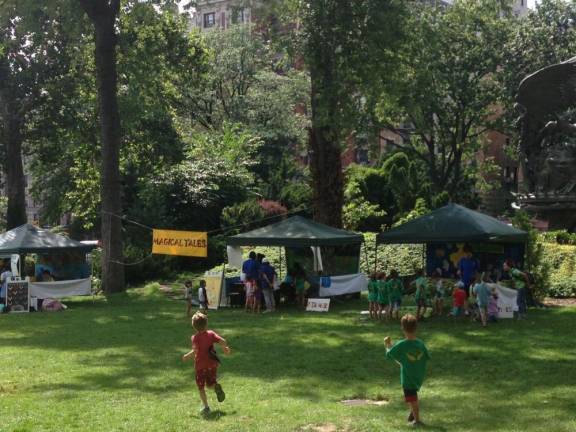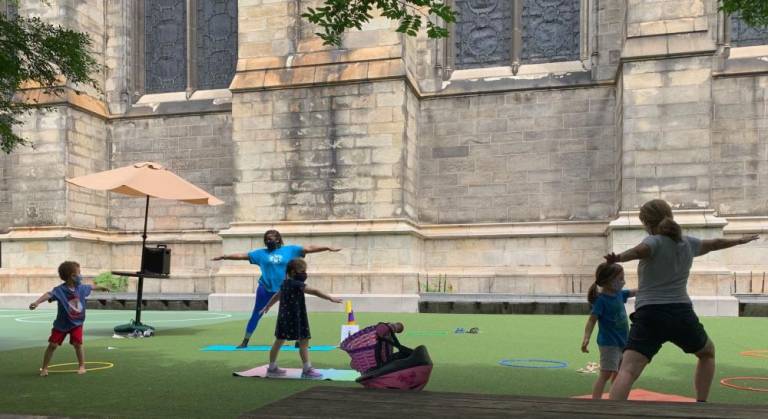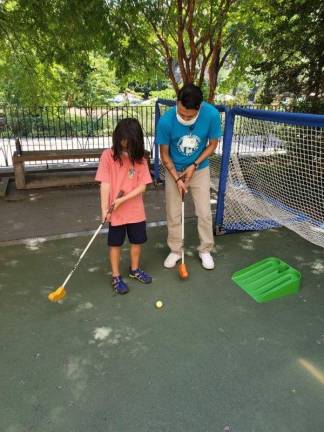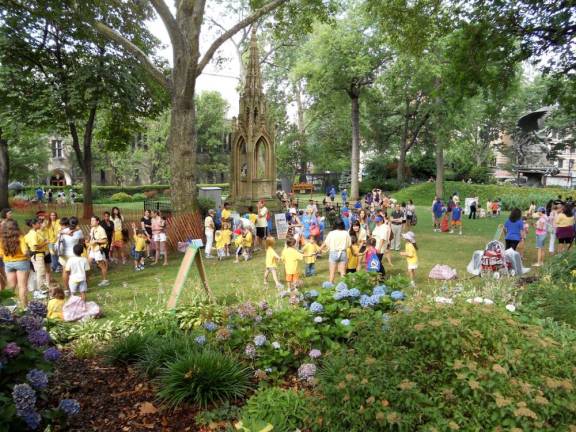Camp at the Cathedral
A Morningside Heights summer program aims to foster connection as children re-enter the social world




Nestled between apartment buildings and coffee-shop-lined streets lies the sprawling grounds of the Cathedral of Saint John the Divine. The world’s largest Gothic cathedral, its beauty lies not only in the stained glass lining the Nave, but in its status as a fixture of the Morningside Heights community. Though the church participates in a range of neighborhood-oriented activities, it is perhaps best known among youth in the area for its entirely secular Advancing the Community of Tomorrow (ACT) programming, and most notably its summer camp.
ACT offers a total of 9 programs, among them a nursery school and after-school. Yet the summer camp is one of its largest initiatives, hosting between 200-250 students per year, typically between the ages of three-and-a-half and fourteen. The camp lasts for five weeks and consists of three different sessions: a three-week July session that mirrors a typical day camp experience, week-long August specialty camps in which students can focus on a certain subject, and a week-long August adventure camp that has a different theme each day. As ACT approaches its 50 year anniversary, it is finding ways to adapt to the fluctuating needs of residents, many of whom have dramatically reshaped their lives during the COVID-19 pandemic.
“Our mission is always to provide services to the family and the community, so as the community needs change, so do we,” explained Executive Director Marie Del Tejo, who began working at ACT Summer Camp in 1990 and entered her current position in June of 2020. As ACT has welcomed back students in tandem with schools—all activities have been moved outdoors, group sizes are limited, and distance guidelines are followed — Del Tejo has noticed a shift in students’ demeanors, noting that they may be more in need of an escape than ever before.
“I think that one of the draws of ACT is that it’s always been a program that disconnects. We disconnect from electronics, from the TVs, from all that children are constantly around,” Del Tejo explained. “Throughout this whole year, I found that there were a lot of families who just needed to talk to someone about the process of their children being emotionally drained ... Because so many of the children have been alone at home, they need guidance in rejoining the social world.”
Mental Health Discussions
This summer, ACT plans to incorporate more team-building activities and organized mental health discussions. Staff training will also include conversations around mental health, as children are not the only ones experiencing mental fatigue. ACT Summer Camp has the capacity to greatly help adults through periods of strife as well, as it did for Nancy Torres, who first started working there in the summer of 1976 and stayed for over 40 years.
Before coming to work at the Cathedral, Torres had worked at a Jewish nursery school. During her time there, she was sexually abused by the rabbi, a story she only began telling publicly in 2019. Amid a painful and confusing period of Torres’ life, the Cathedral, and ACT Summer Camp in particular, provided comfort.
“The Cathedral saved my life, really — that’s how I look at it,” Torres said through tears. “The Cathedral became my home ... I hid away that horrible thing that had happened and we had this glorious experience.”
Torres went on to marry the camp director and form her strongest friendships before sending her own children to ACT Summer Camp years later. Though Torres’ relationship with ACT is uniquely strong, the program aims to make every camper and staff member’s experiences as powerful and lasting.
When asked what she hopes campers get out of camp this year, Del Tejo responded that she hopes they can “depend on their friends and adults for support....It’s building that trust, but also helping the staff be compassionate, to understand that this is a difficult time for many children and they just need a little shift.”
Need for Structure
Torres agrees that the need for youth summer programming is particularly acute this year, as she thinks that children need a degree of structure work through periods of emotional strain. She hopes that the Counselors in Training will embrace the unique experience of caring for children and allow themselves to feel young again, rather than weighted with the struggles of pandemic-era life.
In an ideal world, ACT Summer Camp would be able to serve every child who wants to attend. Yet given the economic diversity of City Council District 7, which stretches from 96th Street to 165th Street, not all locals are able to afford the camp. ACT has had a financial aid fund for many years — Torres worked on a financial aid committee during her time at the camp and expressed its importance to the institution — and is devoted to making sure that finances are as small a part of the ways campers and staff relate to one another as possible.
“My goal was to never know who was on financial aid. I didn’t even want the staff to know, because I want everybody to be treated the same,” Del Tejo said. “There’s a part of you that shifts your emotions as soon as you learn new information. Well, if you don’t have the information, you can’t shift.”
While there is always a high demand for financial aid, the level of economic need has increased this year, with Del Tejo saying that she has more families than ever asking about costs, many of whom have children that have attended ACT Summer Camp in previous years. Though ACT is not raising their fees and is implementing a different payment plans, there are still many more parents asking about financial aid, indicating the economic toll that the COVID-19 pandemic has had all across the city.